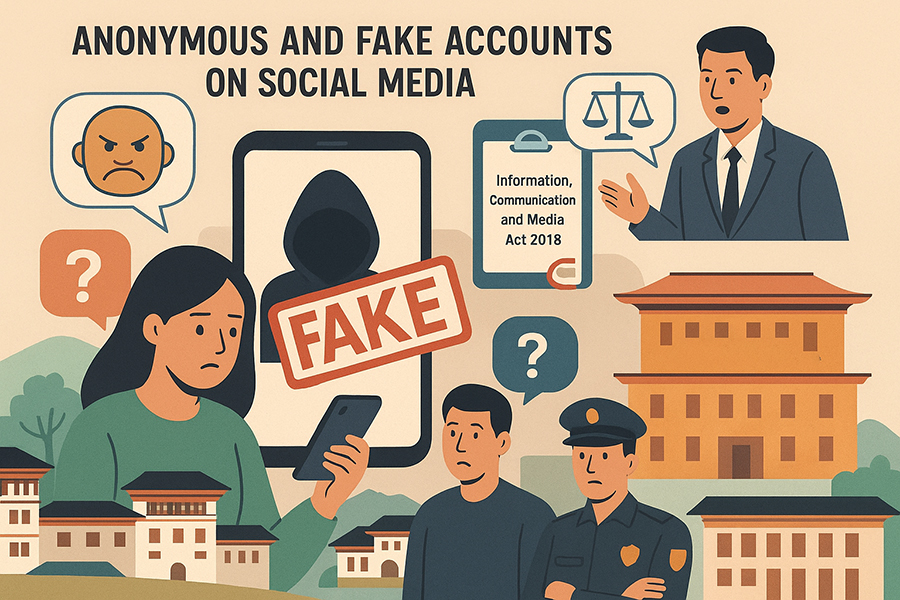 As social media use continues to surge worldwide, Bhutan is witnessing a growing wave of anonymous and fake accounts. The trend has sparked public concern and debate over accountability in the digital space. In this story, we explore the issue from a legal perspective, as authorities are reviewing the Information, Communications and Media Act of Bhutan 2018 to address emerging challenges in the country’s rapidly evolving media landscape.
As social media use continues to surge worldwide, Bhutan is witnessing a growing wave of anonymous and fake accounts. The trend has sparked public concern and debate over accountability in the digital space. In this story, we explore the issue from a legal perspective, as authorities are reviewing the Information, Communications and Media Act of Bhutan 2018 to address emerging challenges in the country’s rapidly evolving media landscape.
While social media connects people and gives voice to public opinion, many Bhutanese say fake accounts have turned it into a hub for misinformation, hate, and personal attacks. This trend is deepening divisions and raising concerns about accountability and online ethics.
“Most users create fake Facebook accounts anonymously to spread disagreements, misinformation, and even create conflicts between the government and the public. This has significant negative impacts, as we cannot be sure whether the information they share is true. As a result, we sometimes end up believing their posts, even when they are false,” said Thinley Wangdi, Private Employee, Thimphu.
“I have come across many fake accounts used for stalking users. People also express feelings they cannot share while revealing their identity. These fake accounts are sometimes used to scam people and take money from them,” said Sonam Yangchen, a student, Thimphu.
“Looking at the rise of fake accounts on social media, from a youth’s point of view, I feel that the future ahead of us is one with corruption and unfairness,” said Dawa, another student from Thimphu.
Some say that anonymity plays an important role in democracy and safety. It lets whistleblowers expose corruption, protects activists, journalists, and abuse victims, allows marginalised communities to speak freely, and encourages open discussion on sensitive or controversial issues.
However, legal experts suggest that the government should also encourage free expression by creating safe spaces for speakers, protecting them from retaliation and enforcing anti-harassment and defamation laws.
“For the larger interest, they might express themselves through anonymous accounts, but I feel they cannot claim it as an absolute right. It is not completely restricted, but everyone must be mindful of what they say, whether using their real identity or a hidden one,” said Sonam Yangden Thai, Senior Attorney/Member, Bar Council of Bhutan.
Some users believe that freedom of expression should not come at the cost of defaming others or spreading lies. They believe that while social media allows people to share their opinions freely, it should not be misused to cause harm to a person’s reputation or mental well-being.
Meanwhile, legal experts said that Bhutan’s existing laws already provide measures to address online misconduct.
“In the Penal Code, there is a clear section covering defamation laws. So, whether it is through a real account or an anonymous one, if you defame someone by spreading false information, you are liable for a defamation suit and can be prosecuted. The victim can also sue for compensatory damages through a civil suit. In addition, the Civil Liability Act now allows claims for non-economic damages as well,” said Sonam Yangden Thai, Senior Attorney/Member, Bar Council of Bhutan.
Legal experts, BBS spoke to, said that prosecutors often rely on general laws like defamation or fraud, which were not designed for online crimes. They said the rise of AI-driven threats such as deepfakes, bot networks, and fake online identities shows the need to urgently update the Information, Communication and Media Act to address these emerging cyber issues.
The GovTech agency is leading a review of the Act to update it for today’s technology. The revision aims to close gaps and better address cybercrime, data misuse, social media issues, and strengthen data protection and cybersecurity.
“The Act, along with the Rules and Regulations on Content 2019, ensures good practices and maintains content standards for Bhutanese ICT and media service providers. However, legal experts say these regulations mainly apply to licensed media outlets, making it difficult to address content from anonymous or unlicensed online sources.”
According to police, anonymous social media users can be traced using technical tools like IP tracking and geolocation, along with help from platforms and internet providers during criminal investigations.
The Bhutan InfoComm and Media Authority (BICMA), which is responsible for monitoring media content such as news, current affairs, culture, and public interest topics, received eight formal complaints related to misinformation and hate speech since August this year.
As the country develops its cyber legal framework, incorporating provisions that balance the benefits and risks of anonymous expression will best support democratic discourse, protect individual privacy, and ensure public safety.
Kinzang Lhadon
Edited by Sonam Pem







